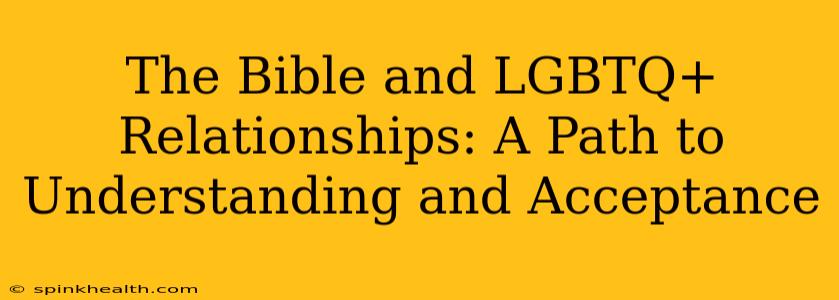The intersection of biblical texts and LGBTQ+ relationships is a complex and often contentious topic. Interpretations vary widely, leading to both condemnation and affirmation within religious communities. This exploration aims to navigate the complexities, fostering understanding and promoting respectful dialogue. It's crucial to remember that this is a nuanced discussion, and there is no single, universally accepted interpretation.
What does the Bible actually say about homosexuality?
This is a frequently asked question, and the answer requires careful consideration. The Bible contains several passages often cited against same-sex relationships, primarily Leviticus 18:22 and 20:13, and 1 Corinthians 6:9-10. However, it's crucial to understand the historical and cultural context in which these verses were written. Leviticus, for example, outlines a comprehensive code of laws for ancient Israel, including dietary restrictions and regulations regarding hygiene, which are not generally followed by modern believers. Interpreting these specific verses literally while ignoring others presents a selective and potentially misleading approach. Furthermore, the understanding of gender and sexuality in ancient cultures differed significantly from modern perspectives. A direct, literal application of these passages to contemporary LGBTQ+ relationships neglects this vital historical and cultural context.
Are there any passages in the Bible that support LGBTQ+ inclusion?
While explicit endorsements of same-sex relationships are absent from the Bible, some argue that the overarching themes of love, compassion, and acceptance suggest an inclusive approach. The emphasis on God's love for all humanity, as exemplified in the teachings of Jesus, is central to many interpretations that promote inclusivity. Focusing on the principles of love and forgiveness, rather than on isolated verses, opens a path to a more compassionate understanding of LGBTQ+ individuals. Moreover, many scholars emphasize the importance of interpreting scripture within its historical context and considering the evolving understanding of human sexuality and identity.
How do different denominations interpret biblical passages on sexuality?
The interpretation of biblical passages regarding sexuality varies significantly across different Christian denominations and even within individual congregations. Some denominations maintain traditional interpretations, emphasizing the condemnation of same-sex relationships. Others adopt more progressive viewpoints, emphasizing God's love and acceptance of all people, regardless of sexual orientation or gender identity. This divergence in interpretation reflects the ongoing theological debate and the varied ways in which people engage with religious texts. Understanding these diverse interpretations is key to promoting respectful interfaith dialogue.
Does the Bible condemn all non-procreative sexual acts?
Many interpretations that condemn same-sex relationships also condemn other forms of non-procreative sexual acts, such as premarital sex or masturbation. However, the emphasis and application of these interpretations vary widely. Some emphasize a focus on the sanctity of marriage as the sole context for sexual activity, regardless of the potential for procreation. Others focus more broadly on the principles of love, commitment, and mutual respect within any sexual relationship. This lack of consistency highlights the inherent complexities and challenges in applying ancient texts to modern ethical dilemmas.
What is the role of grace and forgiveness in understanding the Bible's teachings on LGBTQ+ relationships?
The concept of grace and forgiveness is central to Christian theology. Many argue that applying these core principles to interpretations of scripture allows for a more compassionate and inclusive understanding of LGBTQ+ relationships. Focusing on God's unconditional love and the potential for redemption and forgiveness can lead to a more holistic and empathetic approach, fostering acceptance and understanding within religious communities. This perspective prioritizes personal growth and spiritual transformation over strict adherence to potentially outdated interpretations of specific verses.
Conclusion:
The dialogue surrounding the Bible and LGBTQ+ relationships is ongoing and multifaceted. There is no single, definitive answer. Understanding the historical context, diverse interpretations, and overarching themes of love and compassion is crucial for fostering respectful dialogue and promoting acceptance within religious and secular communities. Ultimately, personal faith and individual interpretation play significant roles in shaping one's perspective on this complex issue. Continued open and honest conversations are essential for building bridges and creating a more inclusive and understanding world.

